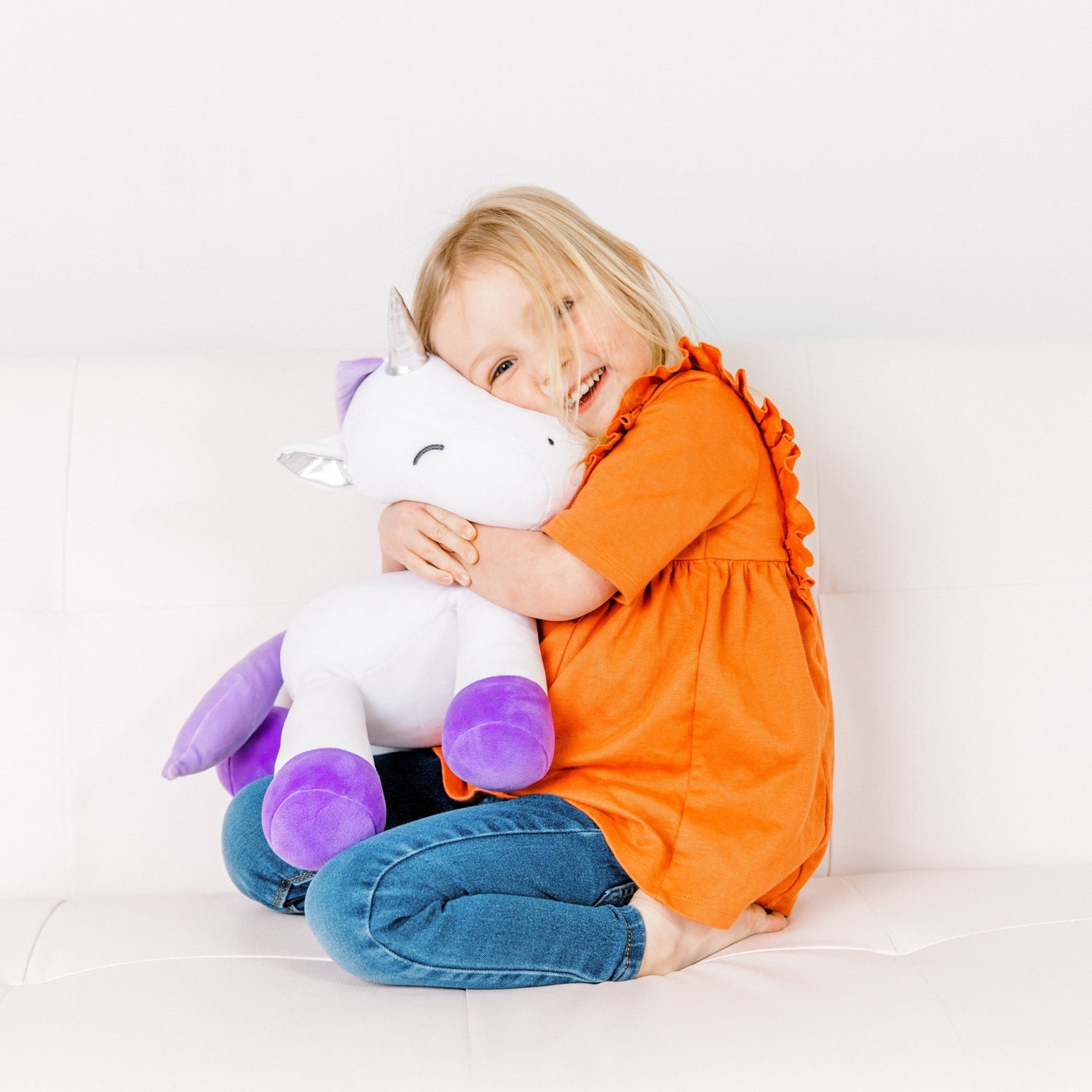
6 Reasons Kids Love Stuffed Animals
Picking up toys after playtime often means gathering puzzle pieces, plastic action figures, or even toy kitchen accessories. No matter the gender of your child, every parent has flung stuffed animals into baskets over and over. Plush toys seem to take over a home, but why do kids love stuffed animals? We all had at least one plush best friend. Teddy bears, Disney characters, and sea creatures find their way into homes. They went everywhere with us. All children seem to become super attached to a plushie at some point, but why?
1. Stuffed animals create a safe space for creativity and imagination
A study completed by North Dakota State showed how important it is to encourage children to be creative and use their imagination. When you watch an infant hugging their stuffed animal, it may not appear that they are playing. The reality is these kinds of toys help develop social skills. Experts believe the best age to begin utilizing plush toys to stimulate imaginative play is between 12 and 18 months. For instance, imagining using a bottle enables kids to assume the caregiver's position while also allowing them to exercise their imagination.
2. Stuffed animals provide children with a sense of safety
Stuffed animals offer a sense of security, predictability, and comfort in an often uncertain and frightening world.
Beth Tyson, a Psychotherapist and children's author, said, "Go to any toy store with a child, and you will likely see them go straight for the pile of stuffed animals. Just like many adults, babies and children can experience anxiety. When they do, they seek out people or objects that provide support. Cuddling a soft object can soothe a child's fears, especially when separated from a parent or caregiver."
It's human nature for everyone, especially children, to look for feelings of peace and safety. It isn't uncommon for people to find those feelings in the arms of a teddy bear. Many believe that children who spend more time holding a stuffed animal tend to feel more calm and secure than others.
3. Stuffed animals give the best, soothing hugs
Nothing cheers a child like a warm, plushie hug, and it doesn't get warmer or plushier than a stuffed animal. Couple that with their stuffed animal's willingness to take hugs of the most significant length and intensity without gasping for air or needing to rush off. Hugging a toy robot or a Barbie doesn't measure up to that cuddly softness.
Katie Lear said plush toys are inherently soothing because they provide a multi-sensory experience. They have button eyes and colorful fur with a soft, fuzzy texture. Some kids even talk about their favorite toys having a specific smell that is comforting.
Softness in sensory toys has proven to be critical. One study on attachment objects published in the National Library of Medicine found that 31% of children prefer teddy bears, while only 7% choose plastic toys. The rest chose security blankets, rags, and cloths.
4. Stuffed animals promote maturity and responsibility
Children spend their days learning and being told what to do. Playing with stuffed animals gives children a safe space to practice what they've learned and be in charge. Plush toys make great recipients of a child's pretend care and discipline. They're small, fluffy, happy, and perfectly obedient. Playing "mommy" or "daddy" to their little stuffed animal makes children feel capable and in control.
When playtime is complete, this is an opportunity to build on a child’s success and confidence. There is nothing easier than picking up stuffed animals after playtime. Their overstuffed bodies are gentle on little hands, and putting them away can mean simply tossing them onto their bed. This activity is an easy success for your child and gives them something to take responsibility for.
4. Stuffed animals are easy to talk to and help with social-emotional skills
Stuffed animals and how children play with them help the child learn critical social-emotional skills. Experts say that children learn empathy, nurturing, and caretaking, to name a few. They also practice speaking and push their imagination which is crucial to childhood development. This helps improve their speech and language abilities at their early age.
This successful activity is why therapists tend to use stuffed animals to help kids reenact stressful events to help them process their emotions. Experts also use stuffed animals to model behavior and discuss challenging feelings and subjects a child wouldn't typically want to discuss.
6. Stuffed animals can help fill a void
Even though most stuffed animals can't walk or talk, they can help kids overcome fill a void. Stuffed animals can make kids feel like they have some control over the things happening in their lives since they can use their imaginations with their stuffed animals.
Life's disappointments never impact stuffed animals. No matter how mistreated or left alone, they always greet their owners with genuinely happy smiles. Their favorite furry creatures seem to make the world seem like a happier place, no matter what.
Stuffed animals can also serve as transitional objects. Donald Winnicott, a renowned child psychologist, studied children to learn why many have a special attachment to a favorite lovey during early childhood. He found that these transitional objects help bridge the gap when a parent is absent. Their plush toy can remind them of their parent's love and care—most transitional objects a child selects are a plush toy or blanket. The toy's gentle nature seems essential and helpful to them.

